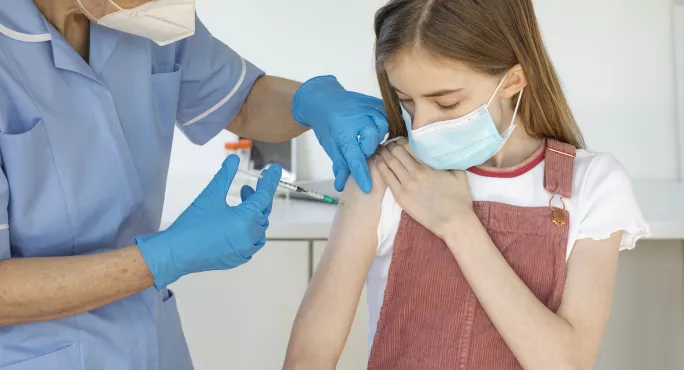Covid: No school vaccinations after this week

The in-school Covid vaccination programme is to end from Friday, headteachers have been told today.
The announcement comes as Covid cases continue to soar, with school leaders warning this is “causing havoc” owing to high levels of absence among students and staff.
The in-school Covid vaccination programme will end this Friday (1 April), the Department for Education confirmed in a letter to schools.
All 12- to 15-year-olds will still be able to access the vaccine but will have to do so outside of school, for example at a vaccination centre, pharmacy or walk-in clinic.
At the beginning of April, healthy five- to 11-year-olds will also be offered the vaccination - however, this will take place solely outside school.
- Covid: Primary-age pupils to be offered Covid jab
- MHRA: Covid-19 vaccine approved for primary pupils
- Covid: Pupil absence more than triples in two weeks
Schools have been asked to “signpost” parents to booking portals online or to walk-in centres.
Last month, the government confirmed that five- to 11-year-olds would be offered the Covid-19 vaccine on a “non-urgent” basis from April, with today’s announcement confirming this would take place at the beginning of the month.
Five- to 11-year-olds will be given a lower dose than those of 12 years or above, of 10 micrograms - a third of the adult dose.
Julie McCulloch, director of policy at the Association of School and College Leaders, said that this “appears to be the first time” the DfE has informed the sector about the in-school Covid-19 vaccination programme ending on 1 April.
She praised the efforts of schools, which “with no prior experience of involvement in such a major public health initiative” have played an important role in the vaccine roll-out.
However, she said that “although the mood music from the government appears to be about life returning to something like normality”, Covid is still “causing havoc with high levels of absence among both students and staff”.
Doubts over the next phase of ‘living with Covid’
On 1 April, free symptomatic and asymptomatic testing will end for the general public in England, although the elderly and most vulnerable will still be able to receive free testing.
Previously, the DfE confirmed that secondary school staff and pupils will be able to access free Covid-19 tests in response to outbreaks.
With 1 April fast approaching, Ms McCulloch said that schools were still waiting for “formal guidance” on what the next phase of the “living with Covid” strategy means for them.
“With just three days left until it comes into effect, the very least they deserve is an explanation from the government of what they are expected to do,” she said.
Last week, government figures from 17 March revealed that pupil absences had tripled in a fortnight and one in 10 teachers were absent from school.
And Covid-related pupil absences rose fastest in primary settings, increasing by 264 per cent (from 33,200 to 120,900) in the two-week period.
Register with Tes and you can read two free articles every month plus you'll have access to our range of award-winning newsletters.
Keep reading with our special offer!
You’ve reached your limit of free articles this month.
- Unlimited access to all Tes magazine content
- Save your favourite articles and gift them to your colleagues
- Exclusive subscriber-only stories
- Over 200,000 archived articles
- Unlimited access to all Tes magazine content
- Save your favourite articles and gift them to your colleagues
- Exclusive subscriber-only stories
- Over 200,000 archived articles



